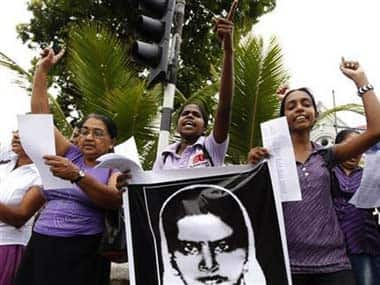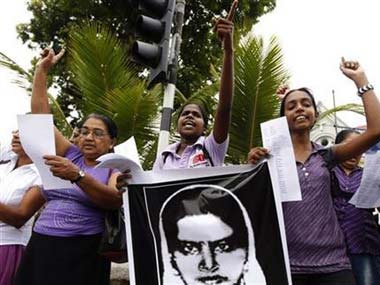The recent beheading of an underage Sri Lankan maid in Saudi Arabia has shocked the world, but in Tamil Nadu, a Muslim group has reportedly slammed a writer for his views against this barbaric act. One would have expected the incident, which is yet another instance of the human rights violations of women migrant workers in Saudi Arabia, to outrage people in the region. But as The Hindu reported on Tuesday, “Tamil Nadu Thowheed Jamaath” has challenged a writer and DMK chief Karunanidhi for a public debate on the death penalty, indirectly justifying the killing. The victim, Rizana Nafeek, was a Muslim girl, who going by her family’s account, was just a kid. But the Saudis had no qualms in beheading her, notwithstanding the shock expressed by the UN, Human Rights Watch, and EU, or even the desperate pleas of the Sri Lankan government. The issue that is being covered up in Tamil Nadu as an Islamic debate on death penalty, however raises two important questions: the unhindered and brutal abuse of migrant women by Saudi Arabia and the inability of countries such as Sri Lanka and India to check this practice because of their dependence on the blood and sweat of its migrant women. [caption id=“attachment_606239” align=“alignleft” width=“380”]  Protests in Sri Lanka following the beheading: Reuters[/caption] First, let’s look at the plight of migrant women from Sri Lanka in Saudi Arabia and the Middle East. By November last year, Sri Lankan migrant workers sent home a record US$ 5.43 billion, which was more than 10 percent of the country’s economy. Of this, nearly half came from women, most of whom are housemaids in Saudi homes. A few years ago, about 80 per cent of remittances to the country came from women. The fact of the matter is that these women have protected the Sri Lankan economy with their menial jobs for years - even during the high-cost war and the global financial crisis. Six years ago, these remittances had accounted for 34% of Sri Lanka’s export earnings, about two-thirds of which came from women. A study by Monash University - one of the many pieces of research on migrant women in Sri Lanka - shows that in the Gulf countries, women work in “unregulated and isolated conditions” with “significant risk of abuse and exploitation”. Even as academic euphemisms, these expressions indicate the scary conditions in which the women work. The International Organisation of Migration (IOM) and the Human Rights Watch have documented that the women are subjected to physical and sexual assaults, besides other forms of intimidation and violence such as confiscation of passports, enslaved working conditions and torture by their employees. The main culprit in such cases are the governments of “sending countries” themselves, because they don’t want to kill the geese that lay these golden eggs. For instance, as the Monash study noted, the Sri Lankan government had been “cautious” in tackling the issue for the fear of losing its “competitive advantage”. What is this competitive advantage? The availability of its women for abuse in return for a few dollars in foreign exchange. In fact, a few years ago, the Sri Lankan government had stooped to apologising to the Saudis when a maid from the country committed suicide on the latter’s soil. Although there have been relentless efforts by the IOM and oragnisations such as Migrants Forum and Caram Asia along with national governments to improve the working conditions of women in the Arab states, Saudi Arabia has steadfastly stonewalled every request because they employ the largest number of migrant women in menial jobs. While most Middle Eastern countries agreed to the Sri Lankan government’s request to raise the minimum wage to US$ 150 for maids, the Saudis asked them to take a walk. The beheading incident is a wake up call for not only Sri Lanka, but also for countries such as India. A few months ago, another maid, this time from Indonesia, was executed on some unproven grounds. India is the biggest beneficiary of remittances (US$ 70 billion) in the world and workers in Gulf countries contribute more than one-fourth of this. The remittances from the Gulf are second only to that from North America. Cases of abuse, torture and slavery abound among Indian housemaids in Saudi Arabia. States such as Kerala and Andhra Pradesh, which have a high proportion of migrant workers and maids in Gulf countries, routinely report such cases. Earlier this week, an old Muslim woman from Kannur was rescued and brought home after five years of household-slavery in Saudi. The slavery and torture of Indian housemaids in Saudi was also the theme of Gaddama a recent mainstream feature film in Malayalam. Now, let’s look a little closer at the horror called Saudi Arabia. Here are some highlights from the Human Rights Watch Report 2012 Saudi Arabia has no penal code, so prosecutors and judges largely define criminal offenses at their discretion. Lawyers do not assist suspects during interrogation and face difficulty examining witnesses or presenting evidence at trial. Detainees, including children, commonly face systematic violations of due process and fair trial rights, including arbitrary arrest and torture and ill-treatment in detention. Saudi judges routinely sentence defendants to thousands of lashes. Employers abuse the kafala (sponsorship) system to confiscate passports, withhold wages, and force migrants to work against their will. In August, Jadawel International, owned by Saudi Arabia’s third richest man, Shaikh Muhammad bin Issa Al Jaber, was six months in arrears with salary payments, as in previous years, and managers threatened workers against pursuing complaints in labor court. Some 1.5 million migrant domestic workers remain excluded from the 2005 Labor Law. As in years past, Asian embassies reported thousands of complaints from domestic workers forced to work 15 to 20 hours a day, seven days a week, and denied their salaries. Domestic workers, most of whom are women, frequently endure forced confinement, food deprivation, and severe psychological, physical, and sexual abuse. In December 2010, authorities made no attempts to rescue an Indonesian migrant domestic worker who had worked for 10 years without pay and whose sponsors were “renting” her out to other houses, according to one Saudi woman who informed authorities. In November 2010, authorities in Abha, southern Saudi Arabia, recovered the body of Kikim Komalasari, a 36-year-old Indonesian domestic worker, bearing signs of extensive physical abuse. In September an appeals court overturned a three-year prison sentence for the employer found guilty of severely assaulting Sumiati Mustapa, her Indonesian domestic worker. And this is where countries like India willingly send their women! With the shock of the beheading of Rizana Nafeek, Sri Lanka has finally decided to stop sending housemaids to Saudi, but only over the next seven years. It needs time to reduce its dependance on the money of its poor maids and hence is planning a “gradual phase out”. India, which had raised the age-limit of housemaids to 30 a while ago in a bid to reduce the risk of exploitation, should act faster and completely stop sending its women to serve the ruthless Saudis. There should be a total clampdown on the recruitment of maids to Saudi. Ethics and human rights should be above economic interests of countries, and religious allegiance of hardline groups.
The beheading incident is a wake up call for not only Sri Lanka, but also for countries such as India. A few months ago, another maid, this time from Indonesia, was executed on some unproven grounds.
Advertisement
End of Article


)

)
)
)
)
)
)
)
)



